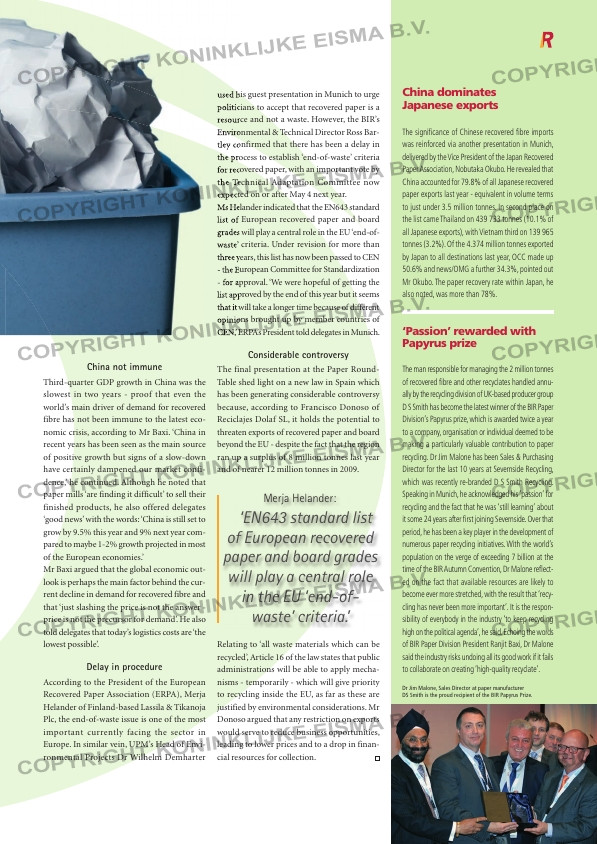Page 31 from: November 2011

China not immune
Third-quarter GDP growth in China was the
slowest in two years – proof that even the
world’s main driver of demand for recovered
fibre has not been immune to the latest eco-
nomic crisis, according to Mr Baxi. ‘China in
recent years has been seen as the main source
of positive growth but signs of a slow-down
have certainly dampened our market confi-
dence,’ he continued. Although he noted that
paper mills ‘are finding it difficult’ to sell their
finished products, he also offered delegates
‘good news’ with the words: ‘China is still set to
grow by 9.5% this year and 9% next year com-
pared to maybe 1-2% growth projected in most
of the European economies.’
Mr Baxi argued that the global economic out-
look is perhaps the main factor behind the cur-
rent decline in demand for recovered fibre and
that ‘just slashing the price is not the answer –
price is not the precursor for demand’. He also
told delegates that today’s logistics costs are ‘the
lowest possible’.
Delay in procedure
According to the President of the European
Recovered Paper Association (ERPA), Merja
Helander of Finland-based Lassila & Tikanoja
Plc, the end-of-waste issue is one of the most
important currently facing the sector in
Europe. In similar vein, UPM’s Head of Envi-
ronmental Projects Dr Wilhelm Demharter
used his guest presentation in Munich to urge
politicians to accept that recovered paper is a
resource and not a waste. However, the BIR’s
Environmental & Technical Director Ross Bar-
tley confirmed that there has been a delay in
the process to establish ‘end-of-waste’ criteria
for recovered paper, with an important vote by
the Technical Adaptation Committee now
expected on or after May 4 next year.
Ms Helander indicated that the EN643 standard
list of European recovered paper and board
grades will play a central role in the EU ‘end-of-
waste’ criteria. Under revision for more than
three years, this list has now been passed to CEN
– the European Committee for Standardization
– for approval. ‘We were hopeful of getting the
list approved by the end of this year but it seems
that it will take a longer time because of different
opinions brought up by member countries of
CEN,’ ERPA’s President told delegates in Munich.
Considerable controversy
The final presentation at the Paper Round-
Table shed light on a new law in Spain which
has been generating considerable controversy
because, according to Francisco Donoso of
Reciclajes Dolaf SL, it holds the potential to
threaten exports of recovered paper and board
beyond the EU – despite the fact that the region
ran up a surplus of 8 million tonnes last year
and of nearer 12 million tonnes in 2009.
Relating to ‘all waste materials which can be
recycled’, Article 16 of the law states that public
administrations will be able to apply mecha-
nisms – temporarily – which will give priority
to recycling inside the EU, as far as these are
justified by environmental considerations. Mr
Donoso argued that any restriction on exports
would serve to reduce business opportunities,
leading to lower prices and to a drop in finan-
cial resources for collection.
China dominates
Japanese exports
The signifi cance of Chinese recovered fi bre imports
was reinforced via another presentation in Munich,
delivered by the Vice President of the Japan Recovered
Paper Association, Nobutaka Okubo. He revealed that
China accounted for 79.8% of all Japanese recovered
paper exports last year – equivalent in volume terms
to just under 3.5 million tonnes. In second place on
the list came Thailand on 439 733 tonnes (10.1% of
all Japanese exports), with Vietnam third on 139 965
tonnes (3.2%). Of the 4.374 million tonnes exported
by Japan to all destinations last year, OCC made up
50.6% and news/OMG a further 34.3%, pointed out
Mr Okubo. The paper recovery rate within Japan, he
also noted, was more than 78%.
‘Passion’ rewarded with
Papyrus prize
The man responsible for managing the 2 million tonnes
of recovered fi bre and other recyclates handled annu-
ally by the recycling division of UK-based producer group
D S Smith has become the latest winner of the BIR Paper
Division’s Papyrus prize, which is awarded twice a year
to a company, organisation or individual deemed to be
making a particularly valuable contribution to paper
recycling. Dr Jim Malone has been Sales & Purchasing
Director for the last 10 years at Severnside Recycling,
which was recently re-branded D S Smith Recycling.
Speaking in Munich, he acknowledged his ‘passion’ for
recycling and the fact that he was ‘still learning’ about
it some 24 years after fi rst joining Severnside. Over that
period, he has been a key player in the development of
numerous paper recycling initiatives. With the world’s
population on the verge of exceeding 7 billion at the
time of the BIR Autumn Convention, Dr Malone refl ect-
ed on the fact that available resources are likely to
become ever more stretched, with the result that ‘recy-
cling has never been more important’. It is the respon-
sibility of everybody in the industry ‘to keep recycling
high on the political agenda’, he said. Echoing the words
of BIR Paper Division President Ranjit Baxi, Dr Malone
said the industry risks undoing all its good work if it fails
to collaborate on creating ‘high-quality recyclate’.
Merja Helander:
‘EN643 standard list
of European recovered
paper and board grades
will play a central role
in the EU ‘end-of-
waste’ criteria.’
Dr Jim Malone, Sales Director at paper manufacturer
DS Smith is the proud recipient of the BIR Papyrus Prize.
p030_ pe .indd 31 07-11-11 11:01



